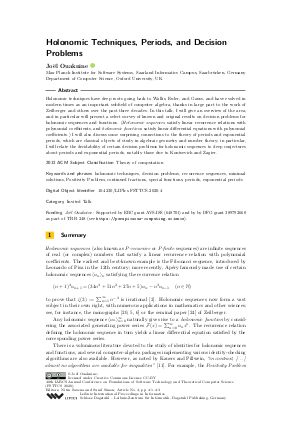Holonomic Techniques, Periods, and Decision Problems (Invited Talk)
Author
Joël Ouaknine 
-
Part of:
Volume:
40th IARCS Annual Conference on Foundations of Software Technology and Theoretical Computer Science (FSTTCS 2020)
Part of: Series: Leibniz International Proceedings in Informatics (LIPIcs)
Part of: Conference: IARCS Annual Conference on Foundations of Software Technology and Theoretical Computer Science (FSTTCS) - License:
 Creative Commons Attribution 3.0 Unported license
Creative Commons Attribution 3.0 Unported license
- Publication Date: 2020-12-04
File

PDF
LIPIcs.FSTTCS.2020.4.pdf
- Filesize: 309 kB
- 3 pages
Document Identifiers
Subject Classification
ACM Subject Classification
- Theory of computation
Keywords
- holonomic techniques
- decision problems
- recurrence sequences
- minimal solutions
- Positivity Problem
- continued fractions
- special functions
- periods
- exponential periods
Metrics
- Access Statistics
-
Total Accesses (updated on a weekly basis)
0Document
0Metadata
Abstract
Holonomic techniques have deep roots going back to Wallis, Euler, and Gauss, and have evolved in modern times as an important subfield of computer algebra, thanks in large part to the work of Zeilberger and others over the past three decades. In this talk, I will give an overview of the area, and in particular will present a select survey of known and original results on decision problems for holonomic sequences and functions. (Holonomic sequences satisfy linear recurrence relations with polynomial coefficients, and holonomic functions satisfy linear differential equations with polynomial coefficients.) I will also discuss some surprising connections to the theory of periods and exponential periods, which are classical objects of study in algebraic geometry and number theory; in particular, I will relate the decidability of certain decision problems for holonomic sequences to deep conjectures about periods and exponential periods, notably those due to Kontsevich and Zagier.
Cite As Get BibTex
Joël Ouaknine. Holonomic Techniques, Periods, and Decision Problems (Invited Talk). In 40th IARCS Annual Conference on Foundations of Software Technology and Theoretical Computer Science (FSTTCS 2020). Leibniz International Proceedings in Informatics (LIPIcs), Volume 182, pp. 4:1-4:3, Schloss Dagstuhl – Leibniz-Zentrum für Informatik (2020)
https://doi.org/10.4230/LIPIcs.FSTTCS.2020.4
BibTex
@InProceedings{ouaknine:LIPIcs.FSTTCS.2020.4,
author = {Ouaknine, Jo\"{e}l},
title = {{Holonomic Techniques, Periods, and Decision Problems}},
booktitle = {40th IARCS Annual Conference on Foundations of Software Technology and Theoretical Computer Science (FSTTCS 2020)},
pages = {4:1--4:3},
series = {Leibniz International Proceedings in Informatics (LIPIcs)},
ISBN = {978-3-95977-174-0},
ISSN = {1868-8969},
year = {2020},
volume = {182},
editor = {Saxena, Nitin and Simon, Sunil},
publisher = {Schloss Dagstuhl -- Leibniz-Zentrum f{\"u}r Informatik},
address = {Dagstuhl, Germany},
URL = {https://drops.dagstuhl.de/entities/document/10.4230/LIPIcs.FSTTCS.2020.4},
URN = {urn:nbn:de:0030-drops-132451},
doi = {10.4230/LIPIcs.FSTTCS.2020.4},
annote = {Keywords: holonomic techniques, decision problems, recurrence sequences, minimal solutions, Positivity Problem, continued fractions, special functions, periods, exponential periods}
}
Author Details
Funding
- Ouaknine, Joël: Supported by ERC grant AVS-ISS (648701) and by by DFG grant 389792660 as part of TRR 248 (see https://perspicuous-computing.science).
References
-
Gil Amparo, Javier Segura, and Nico M. Temme. Numerical methods for special functions, 2007.

- Roger Apéry. Irrationalité de ζ (2) et ζ (3). In Journées Arithmétiques de Luminy, number 61 in Astérisque, pages 11-13. Société mathématique de France, 1979. URL: http://www.numdam.org/item/AST_1979__61__11_0.
-
Alfredo Deaño and Javier Segura. Transitory minimal solutions of hypergeometric recursions and pseudoconvergence of associated continued fractions. Mathematics of Computation, 76(258):879-901, 2007.

-
Alfredo Deaño, Javier Segura, and Nico M. Temme. Computational properties of three-term recurrence relations for Kummer functions. J. Computational Applied Mathematics, 233(6):1505-1510, 2010.

-
Graham Everest, Alfred J. van der Poorten, Igor E. Shparlinski, and Thomas Ward. Recurrence Sequences, volume 104 of Mathematical surveys and monographs. American Mathematical Society, 2003.

-
Philippe Flajolet and Robert Sedgewick. Analytic Combinatorics. Cambridge University Press, 2009.

-
Walter Gautschi. Computational aspects of three-term recurrence relations. SIAM Rev., 9:24-82, 1967.

-
Walter Gautschi. Anomalous convergence of a continued fraction for ratios of kummer functions. Mathematics of Computation, 31(140):994-999, 1977.

-
Walter Gautschi. Minimal solutions of three-term recurrence relations and orthogonal polynomials. Mathematics of Computation, 36(154), 1981.

-
V. Halava, T. Harju, and M. Hirvensalo. Positivity of second order linear recurrent sequences. Discrete Appl. Math., 154(3):447-451, 2006.

-
Manuel Kauers and Veronika Pillwein. When can we detect that a P-finite sequence is positive? In Wolfram Koepf, editor, Symbolic and Algebraic Computation, International Symposium, ISSAC 2010, Munich, Germany, July 25-28, 2010, Proceedings, pages 195-201. ACM, 2010.

- George Kenison, Oleksiy Klurman, Engel Lefaucheux, Florian Luca, Pieter Moree, Joël Ouaknine, Markus A. Whiteland, and James Worrell. On positivity and minimality for second-order holonomic sequences. CoRR, abs/2007.12282, 2020. URL: https://arxiv.org/abs/2007.12282.
-
Maxim Kontsevich and Don Zagier. Periods. In Mathematics unlimited - 2001 and beyond, pages 771-808. Springer, Berlin, 2001.

-
V. Laohakosol and P. Tangsupphathawat. Positivity of third order linear recurrence sequences. Discrete Appl. Math., 157(15):3239-3248, 2009.

-
Lily Liu. Positivity of three-term recurrence sequences. Electron. J. Combin., 17(1):Research Paper 57, 10, 2010.

-
M. Mezzarobba and B. Salvy. Effective bounds for P-recursive sequences. J. Symbolic Comput., 45(10):1075-1096, 2010.

-
Joël Ouaknine and James Worrell. Ultimate positivity is decidable for simple linear recurrence sequences. In Automata, Languages, and Programming - 41st International Colloquium, ICALP 2014, Copenhagen, Denmark, July 8-11, 2014, Proceedings, Part II, volume 8573 of Lecture Notes in Computer Science, pages 330-341. Springer, 2014.

-
Joël Ouaknine and James Worrell. On linear recurrence sequences and loop termination. SIGLOG News, 2(2):4-13, 2015.

-
Joël Ouaknine and James Worrell. Positivity problems for low-order linear recurrence sequences. In Proceedings of the Twenty-Fifth Annual ACM-SIAM Symposium on Discrete Algorithms, pages 366-379. ACM, New York, 2014.

-
Marko Petkovšek, Herbert Wilf, and Doron Zeilberger. A=B. A. K. Peters, 1997.

-
Veronika Pillwein. Termination conditions for positivity proving procedures. In Manuel Kauers, editor, International Symposium on Symbolic and Algebraic Computation, ISSAC'13, Boston, MA, USA, June 26-29, 2013, pages 315-322. ACM, 2013.

-
Veronika Pillwein and Miriam Schussler. An efficient procedure deciding positivity for a class of holonomic functions. ACM Comm. Computer Algebra, 49(3):90-93, 2015.

-
Ernest X. W. Xia and X. M. Yao. The signs of three-term recurrence sequences. Discrete Applied Mathematics, 159(18):2290-2296, 2011.

-
Doron Zeilberger. A holonomic systems approach to special functions identities. Journal of Computational and Applied Mathematics, 32(3):321-368, 1990.

